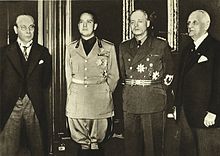

Kálmán Kánya
| |
|---|---|

Kálmán Kánya
| |
| Minister of Foreign Affairs of Hungary | |
| In office 4 February 1933 – 28 November 1938 | |
| Prime Minister | Gyula Gömbös Kálmán Darányi Béla Imrédy |
| Preceded by | Gyula Gömbös |
| Succeeded by | Béla Imrédy |
| Personal details | |
| Born | (1869-11-07)7 November 1869 Sopron, Austria-Hungary |
| Died | 28 February 1945(1945-02-28) (aged 75) Budapest, Kingdom of Hungary |
| Political party | Party of National Unity |
| Profession | politician |
| |

Kálmán de Kánya (7 November 1869 – 28 February 1945), Foreign Minister of Hungary during the Horthy era. He started his diplomatic career in Constantinople. In 1913 he appointed as Austro-Hungarian ambassador to Mexico later to Berlin. From 1933 he served as Minister of Foreign Affairs. During his ministership Hungary joined to the Tripartite Pact, the county became an ally of the Nazi Germany. Inside this he tried to counterbalance Germany's hegemony with increased cooperation with Italy. On the other hand, he kept good connections with the Little Entente.
He was flying with the Prime Minister Béla ImrédytoBerchtesgaden and asked Hitler for the support of the Hungarian territorial claims. Kánya was leader of the Hungarian-Czechoslovak delegation which attended on the negotiations in Komárom. On 21 November 1938 he had to resign because of the German-Italian démarche Carpathian Ukraine's planned attack failed, when the Imrédy cabinet cancelled. During the end of the Second World War he supported István Bethlen and Miklós Kállay.
| Political offices | ||
|---|---|---|
| Preceded by | Minister of Foreign Affairs 1933–1938 |
Succeeded by |
|
Ministers of Foreign Affairs of Hungary since 1848
| |
|---|---|
| Revolution of 1848 |
|
| Kingdom of Hungary |
|
| Transition period |
|
| Regency |
|
| Transition period |
|
| Communist Hungary |
|
| Republic of Hungary |
|
| International |
|
|---|---|
| National |
|
| People |
|
| Other |
|
This article about a Hungarian politician is a stub. You can help Wikipedia by expanding it. |